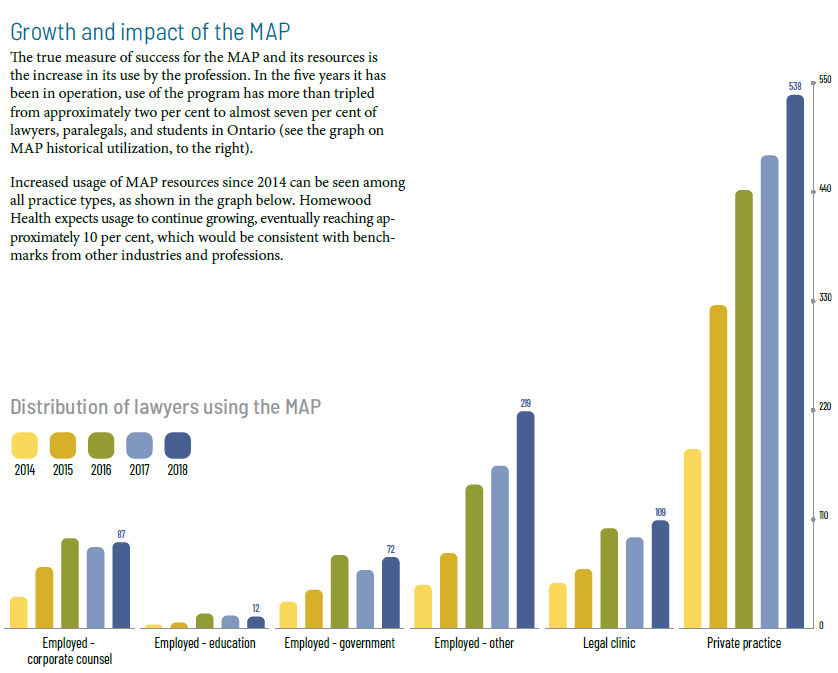« Return to 2020 January - Finding Your Way Issue Index
Using the MAP to find a healthier way

Although compromised mental health within the legal profession has historically been a widespread and deeply rooted problem, increasing awareness and new resources are building a healthier, more resilient, and stronger profession. That’s where myassistplan.com from the Member Assistance Program (MAP) comes in.
The MAP provides Ontario lawyers, paralegals, law students, judges, and family members, with free and confidential counselling, coaching, online resources, and peer volunteer assistance directed at issues related to career, family, finances, addiction, mental or physical health, and other fundamental aspects of their lives.Operated by Homewood Health, an independent program pro-vider, it is co-funded by the LSO and LAWPRO for the purpose of increasing lawyer wellness, productivity, job performance, and career satisfaction, and decreasing health-related practice disruptions and errors. In 2018, the MAP was recognized with the Employee Assistance Society of North America’s Corporate Award of Excellence.
Registering online allows you to access the MAP’s health library, including articles and interactive e-learning courses; receive lifestyle coaching on nutrition, smoking cessation, career planning, finance, retirement; or, schedule confidential counselling or peer-to-peer support sessions that can be held in-person, by phone, or online.

PROFILE IN PEER SUPPORT
The MAP’s peer support program pairs volunteer lawyers and paralegals with individuals calling for support. It can be scheduled in addition to or in substitution for traditional counselling services.
Like every other aspect of the MAP, the peer support program is entirely confidential.
Distinct from the LSO’s Coach and Advisor Network, which provides lawyers and paralegals with access to advice on substantive or procedural questions in their careers, the MAP’s peer support program is aimed at guiding members through mental health struggles and the emotional impact of a legal career.
The purpose of the peer support program is to provide every struggling lawyer, paralegal, or student with a volunteer from the profession who can model recovery while providing empathy and understanding. These volunteers have also lived with mental health and wellness issues in the past and have continued to maintain successful and fulfilling careers.
One such volunteer is Beth Beattie, senior counsel with the Ministry of Health. Beth has been a peer volunteer since 2017, and she says the program is invaluable: “It truly is beneficial to be able to talk to a sympathetic ear, an ear that is experienced and can give perspective.”
Beth’s experience is twofold. First, as a lawyer with 24 years of experience in private practice and with the Government, and second as a woman with 15 years of experience dealing with a diagnosed mental illness.
“I have bipolar disorder, and I was closeted about it for 14 years. I didn’t have a role model. I didn’t know anyone else who had bipolar disorder. I just thought it would be so damaging to my career if word got out. So I kept it quiet for 14 years.”
For Beth, the MAP’s peer support program is an opportunity to provide hope and confidence to others struggling in the profession: “If I had a role model 15 years ago, I would not have lived so many years in angst, because I would have realized that people can have very successful outcomes despite having a major mental illness.”
There are over 40 peers like Beth volunteering with the program. Members seeking assistance are matched to volunteers who have personal experience with subjects like substance abuse, depression, anxiety, or other mood disorders. Attributes like gender, age, race, and other criteria are taken into account when finding a peer with similar experience and with whom a member can identify, confide, and seek advice.
Once matched, the relationships are ongoing and indefinite. Beth speaks by phone with those she is matched with once every two weeks. “I was on the phone with a mentee for an hour and half yesterday,” she says. “You cover a lot of ground. It’s very practical things like putting together a to-do list, or things like office dynamics, or just general health. We talk about things like exercise and diet and medication—I really encourage them to do all of that.”
Beth says she sees the benefit that the peer program provides: “When they’re young, lawyers can get caught up in minutia—like ‘oh my god, I didn’t get that letter out as quickly as I was supposed to’ or ‘I missed that filing deadline’—and I’m able to say ‘look, 95 per cent of things can be fixed. You’re going to be able to fix this.’ You put things in perspective. And I know that it helps them.”
Beth sees positive changes being made in the legal profession when it comes to addressing mental health, but feels that much more work needs to be done: “As a profession, it’s important for us to talk in our workplaces about mental health: how to get it, how to maintain it, where to go for help, and getting assistance from peers and colleagues. The most effective way to combat stigma is for people in the profession with mental illness to speak out.”
The importance of strict confidentiality
While use of the program continues to grow, one of the biggest barriers to accessing assistance for many members is their concerns about confidentiality. Doron Gold, a senior clinician with the MAP, takes these concerns very seriously. His response to hesitant lawyers worried that information provided to the MAP could be passed on to the Law Society, LAWPRO, or a third party is simple: “That simply does not happen.” Stigma, embarrassment, and concerns about confidentiality are all reasons given by members not to call the MAP. For Gold, these are reasons why he and his team “reiterate, and reiterate, and reiterate the sacrosanct nature of client confidentiality.”
OVERVIEW OF MAP RESOURCES
Short and longer-term counselling
Confidential short-term and crisis counselling is available inperson, online, or over the phone from experienced therapists who specialize in issues such as stress, anxiety, substance abuse, depression, burnout, and other personal and mental health issues.
The MAP provides secure and private online counselling sessions, either through private and confidential message exchange, where a counsellor will respond to a private message within two business
days, or through real-time interaction in a private chatroom environment via a secure web board, where all communications are confidential and private.
Longer-term counselling — up to 20 sessions — is available for members seeking treatment for depression or trauma related issues.
Peer-to-peer support
Designed specifically for members of the Ontario legal profession, the MAP’s peer-to-peer support service connects members with a peer who has experienced and overcome the same issues they may be experiencing.
Lifestyle coaching
The MAP’s “Life Smart” resources provide coaching on a variety of subjects such as childcare and parenting, elder and family care, financial and legal issues, nutrition and smoking cessation, as well
as career, retirement, and workplace issues.
Self–directed e-Learning courses
A large online library of health and wellness assessments and self-directed learning resources, including videos, articles, podcasts and e-courses designed to improve personal health and well-being are available at myassistplan.com. Resources can be accessed on any desktop or through the mobile app.
Homewood offers licensees the ability to create an individual profile and receive guided, personalized content and recommendations, including a self-paced online cognitive behavioural program called “i-Volve.” Members can easily access articles on subjects such as anxiety, PTSD, grief and loss, mindfulness and meditation, understanding and treating depression, and myriad other topics, or take online courses that can be completed in a single sitting aimed at taking control of anger, career, stress, and other aspects of their lives.
12weekstowellness.com
Homewood also provides an online, goal-oriented wellness resource under the banner of “12 weeks to wellness.” Individuals set their own goals regarding lifestyle habits, weight, peace of mind, self-esteem, and other wellness aspects, and receive coaching while tracking their progress through assessments and a personal profile.
